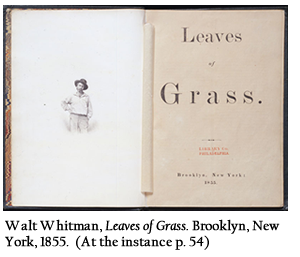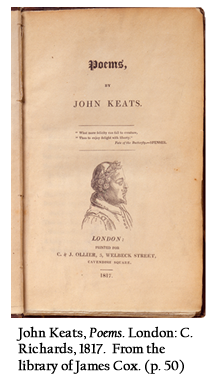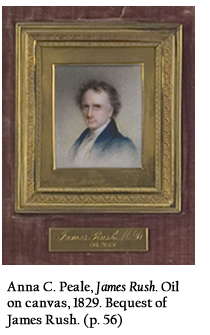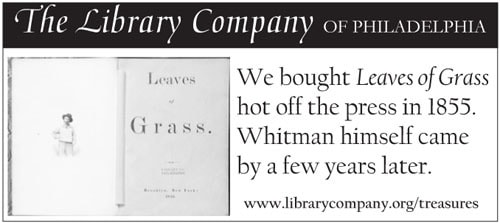Belles Lettres at the Library Company
 In the early years, the Library Company acquired works of literature through purchases from London booksellers made by agents on our behalf or through gifts. The 1741 catalog, published on our tenth anniversary, listed a set of Montaigne’s Essays (London 1685), which came into the collection as a gift from Benjamin Franklin; James Thomson’s The Seasons (London 1733); and John Gay’s Fables (London 1732). In the later decades of the 18th century, American imprints, such as Philip Freneau’s A Poem, on the Rising Glory of America (Philadelphia 1772), were added, but the bulk of the collection remained London or Continental imprints—or American reprints thereof.
In the early years, the Library Company acquired works of literature through purchases from London booksellers made by agents on our behalf or through gifts. The 1741 catalog, published on our tenth anniversary, listed a set of Montaigne’s Essays (London 1685), which came into the collection as a gift from Benjamin Franklin; James Thomson’s The Seasons (London 1733); and John Gay’s Fables (London 1732). In the later decades of the 18th century, American imprints, such as Philip Freneau’s A Poem, on the Rising Glory of America (Philadelphia 1772), were added, but the bulk of the collection remained London or Continental imprints—or American reprints thereof.
In the pre-Dewey decimal system of classification devised by Librarian Lloyd P. Smith in the mid-19thcentury, the category of poetry is more finely subdivided than that of prose fiction. At that time, poetry was a large and immensely respected literary genre, and the Library Company’s collection includes poetry by many now-obscure writers—with extensive holdings of poetry by women. The collection also contains much verse by Classical authors and British poets as well as American works.
 The de-emphasis on prose fiction reflects contemporary ambivalence towards novels in the larger culture. Moralists railed against fiction as time-wasting and mind-tainting. Library Company member James Rush (1786-1869), for example, left a bequest requiring, among its other particular stipulations, that the Library not purchase everyday novels.
The de-emphasis on prose fiction reflects contemporary ambivalence towards novels in the larger culture. Moralists railed against fiction as time-wasting and mind-tainting. Library Company member James Rush (1786-1869), for example, left a bequest requiring, among its other particular stipulations, that the Library not purchase everyday novels.
 Nevertheless the members of the Library Company were sufficiently avant garde in 1855 to have, without fanfare, bought a copy of Leaves of Grass at the time of publication. Nor did they allow the controversy provoked by the slim quarto volume to deter them from acquiring the poet’s revisions of this work and other writings. Whitman himself remained oblivious to the controversy his poetry evoked. “I know I am deathless,” he wrote. “Whether I come to my own today or in ten thousand or ten million years, I can cheerfully take it now, or with equal cheerfulness I can wait.”
Nevertheless the members of the Library Company were sufficiently avant garde in 1855 to have, without fanfare, bought a copy of Leaves of Grass at the time of publication. Nor did they allow the controversy provoked by the slim quarto volume to deter them from acquiring the poet’s revisions of this work and other writings. Whitman himself remained oblivious to the controversy his poetry evoked. “I know I am deathless,” he wrote. “Whether I come to my own today or in ten thousand or ten million years, I can cheerfully take it now, or with equal cheerfulness I can wait.”
In 1873, when Whitman moved to Camden, New Jersey, our members may have had the opportunity to praise or berate the poet personally. It is a legend of the Library Company that Whitman was a regular reader in Library Hall on Fifth Street, and later at Juniper and Locust Streets. Certainly he would have thought it fitting for the Library Company to have his books on its shelves. Our first issue of the first edition of Leaves of Grass in original cloth is not the finest copy known, but what other library can boast of owning its copy since 1855?
Today the collection includes a great deal of 18th- and 19th-century fiction, which provides researchers with useful information about everyday life in all strata of society. The curators also continue to acquire popular period literature, especially marginal items such as broadside verse, mendicants’ books, and pornography, in the interest of building a collection that represents all literary genres, even—or particularly!—those deemed inappropriate by James Rush and his ilk.




Leave a Reply
Want to join the discussion?Feel free to contribute!